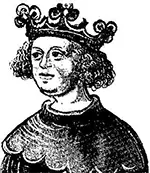Conrad IV: King of Germany
Conrad IV was King of Germany for more than a decade in the 13th Century. A member of the Hohenstaufen dynasty, he was also King of Jerusalem and a son of a Holy Roman Emperor. 
He was born on April 25, 1228, in Adria, in the Kingdom of Sicily. His faster was the reigning Holy Roman Emperor, Frederick II, and his mother was Isabella II of Jerusalem, who died giving birth to Conrad. When Conrad was born and for most of the early years of his life, Frederick was involved in disputes with German princes and with the papacy. Frederick very much wanted a stable succession and so he arranged a marriage for Conrad, his younger son, when the boy was just 7, and then, two years later, had him crowned King of Germany, a title that was then King of the Romans. Isabella, also known as Yolande of Brienne, was Frederick's second wife. He and his first wife, Constance of Aragon, had a child, Henry, born in 1211. That son was in rebellion when Conrad was born, and Frederick resorted to imprisoning Henry. Conrad was definitely Frederick's choice as a successor. The emperor's struggles against the pope took a sharp turn in 1245, and Pope Innocent IV excommunicated Frederick and declared Conrad's kingship invalid. A powerful group of nobles rose up once again against emperor and son, and a man named Henry Raspe had himself declared anti-king of Germany in 1246. Conrad raised a force and fought against Raspe's army. The result was mixed, as Raspe's forces prevailed on the field of battle but Raspe died not long afterward. Another enemy of Frederick and family, William of Holland, took Raspe's place as anti-king and prime antagonist. Conrad lost that battle but still enjoyed some support. He also got married, to Elisabeth of Bavaria, in 1246. Their son, Conradin, was born six years later. Conrad won an important victory over William of Holland in 1250, the same year that his father died. Son inherited father's other titles, which included King of Jerusalem and King of Sicily. William of Holland recorded his own victory the following year, and Conrad's response was to invade Italy. He was still in the bad graces of the pope and tried to make up for it; however, he was unsuccessful in this. Conrad fought on, putting down an uprising and then conquering Naples, in 1253. He died of malaria a year later, on May 21. After his death, no one candidate was strong enough to hold sway, and the German throne remained vacant for nearly two decades. |
|
Social Studies for Kids
copyright 2002–2024
David White




